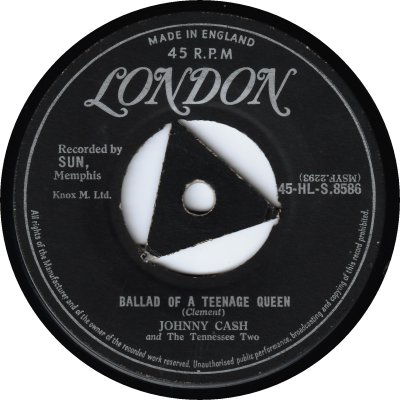
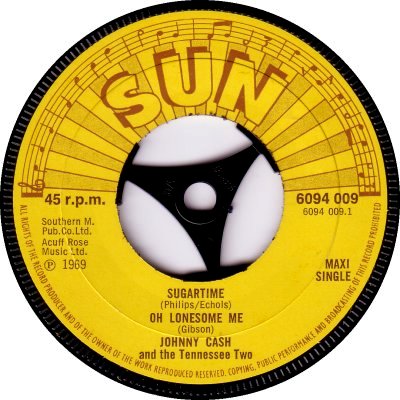
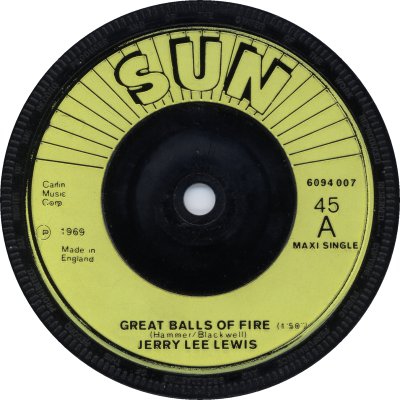
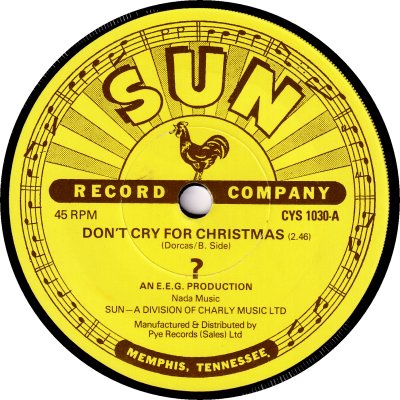
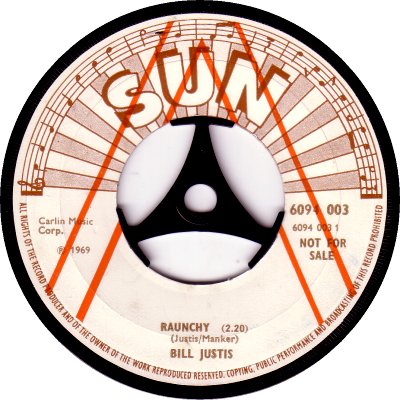
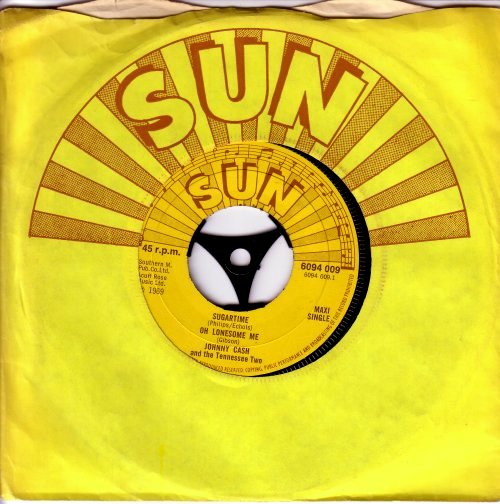
American, operating out of Memphis, Tennessee. Sun was formed by producer Sam C. Phillips in 1952, as a development of his Memphis Sound Studios. Prior to its formation he had generally placed his productions - mainly Blues and R&B - with other companies, but he had also run a short-lived label of his own, Phillips Records. Initially Sun's releases were in the 10" 78rpm format; it issued its first 7" 45rpm single in March 1953 but persisted with the 10" 78s into 1959. Sun's main claims to fame are that it discovered and launched Elvis Presley and was instrumental in the birth of 'Rockabilly', a blend of Country and R&B. 'Billboard' of the 7th of August 1954 noted that Sun had signed Presley and that it was giving all-out promotion to his recording of 'That's All Right'. Just over a year-and-a-half later Presley was lost to RCA Victor in a deal which covered all of his product to that point, issued and unissued. Sun was paid the sum of $40,000 for his contract ('BB', 3rd December 1955).
Sun had a successor to Presley at hand, in the form of Carl Perkins. 'BB' of the 3rd of March observed that Sun was 'developing' Perkins to take Presley's place, and commented in passing that the line between Country, Pop and R&B was becoming blurred. The following week 'BB' of the 10th said that Perkins's 'Blue Suede Shoes' had entered the Charts, but hospitalization after a car accident meant that he was unable to take full advantage of that success. Perkins wasn't the company's only rising star: 'BB' of the 7th of July 1956 noted that it had also got a Johnny Cash single into the charts, less than a month after Presley's departure. The article described Sun as a 'most outstanding record label'. Roy Orbison made his first records for Sun that same year, but he only found fame after moving to Monument in 1959. Towards the end of the year Sun released the first single by another artist who would soon go on to be a household name, Jerry Lee Lewis; the single was 'Crazy Arms' ('BB', 22nd December 1956).
1957 saw the arrival of a sister-label to Sun, Phillips International. It seems to have offered broadly the same fare as Sun, initially at least, but it put out the first recordings by Charlie Rich, another artist who went on to enjoy worldwide fame. On the same label, Carl Mann registered a good number of hits: 'BB' of the 10th of August 1959 stated that he had brought 'a new excitement' to the company, and that Rich was 'showing promise'. A boost was needed as by that time both Perkins and Cash had been lost to Columbia. Cash's departure didn't prevent Sun from putting out a further string of singles, as Phillips had had the foresight to hang on to a collection of unissued tracks. In 1959 Bill Fitzgerald was named general manager of Sun's record operations, taking on responsibility for Sun, Phillips International and the associated publishing companies. 'BB' of the 17th of August, reporting on the development, added that Sam Phillips intended to concentrate more on the production and A&R aspects of the company.
In addition to his record labels and publishing companies Phillips also owned a couple of radio stations. 'BB' of the 25th of January 1960 told its readers that he was aiming to increase the number of his stations to seven, the maximum allowed by law. Unusually his two current stations were all-female concerns; they broadcast standards, ballads and band records, which, oddly, meant that neither Sun nor Phillips International records were given any airplay. Sun opened a new studio in the autumn of 1960 ('BB', 26th September), but the pace seems to have faltered after that, and the only mentions of Sun in 'BB' throughout 1962 were adverts for Jerry Lee Lewis singles. Then in 1963 there were suggestions that a tie-up with Mercury was being considered. According to 'BB' of the 9th of March discussions had been taking place for the past four months, with the proposals being that Mercury would license the new studios and would become a sales agent for Sun and Phillips International material, handling distribution, promotion and advertizing. 'BB' of the 6th of April 1963 added that the possibility of Mercury licensing the studio was creating a 'buzz' in Memphis, but subsequent issues offered no further news as to the success or failure of the discussions. 1963 did however see the last Phillips International single and the departure of Jerry Lee Lewis, whose contract expired in September.
Sun continued to release records throughout the mid '60s, but the glory days were over. There was still interest in the company's back catalogue: 'BB' of the 19th of November 1966 reported that Decca executives were negotiating with Fitzgerald for the right to release old Sun material in Britain - Decca had held the rights to Sun material here from 1956 onwards. Sadly the talks appear to have borne no fruit. In 1968 Sam Phillips was named head of Holiday International Records, Fitzgerald going with him as general manager. Then in 1969 Sun was sold to Shelby Singleton Jr. and became part of his SSS International group of labels. 'BB' of the 6th of September said that the deal, which had been completed 'recently', was thought to involve 2,700 masters. In addition Singleton and Phillips went on to form Sun International, which was owned 80% by the former and 20% by the latter; it was intended as a vehicle for the Sam C. Phillips Production Company ('BB', 31st October 1970). Under Singleton, Sun gained a new lease of life - he reissued and licensed-out items from the Sun vaults, but he also put out new material on the label. The release schedules for 1970 and 1971 were reasonably full, but after that they began to fall away. No singles at all were released in 1974, 1975 and 1976; there was a gradual increase over the next two years and decent schedules followed from 1979 to 1982, but from 1983 onwards releases seem to have been sporadic.
In Britain, Sun material was initially licensed to Decca and appeared on the London label with an originating credit to Sun (1); after the first couple of releases singles originating with Sun and Phillips International were given their own HLS prefix. The agreement with Decca lasted into 1965. In 1970 Shelby Singleton signed a three-year licensing deal with Philips Records ('Record Retailer', 4th July), which led to the Sun label making its first appearance here in its own right. His SSS (q.v.) label also appeared here, under the same deal, but very briefly. The first five Sun singles came out in a batch, on the 23rd of October. After that the rush slowed to a trickle, and only four more 7" records were issued before the agreement expired; the final three were maxi-singles. Most of the records have paper labels (2), but at least two - the Jerry Lee Lewis one shown (3) and Johnny Cash's 'I Walk The Line' (6094-008; 9/71) - can also be found in injection moulded form; presumably those were re-pressings. Promo copies had white labels with a large hollow 'A' (5), and there was a company sleeve (6). Philips group records were generally given six-figure catalogue numbers beginning with a '6', at this time; Sun singles followed the convention and were numbered in the 6094-000s. According to 'Music Week' of the 1st of December 1973 Singleton's agreement with Philips was to expire in the following summer and there was a rush on to issue unreleased material from the vaults, so it looks as though the initial deal was extended by a year.
Another, fuller, tranche of reissues followed later in the decade. 'BB' of the 9th of August 1975 reported that a new company called Charly Records had come to an arrangement with the Shelby Singleton Corporation to issue 'historic' material from Sun, SSS and Plantation in the UK. Much of that material was released on the main Charly label (q.v.), but from 1977 to 1980 a few contemporary singles came out on Charly's version of the Sun label (4). Charly's Sun issues shared their parent's CYS-1000 numbering and, like Charly itself, were distributed by Lugton or by Pye for the most part, with Spartan taking over from Pye towards the end of the decade. Neither of the British versions of Sun are commonly encountered, though the Charlys seem to be the commoner of the two.
Despite its iconic status and recognizability, the Sun label as such never featured in the UK Singles Charts, all of its successes coming during the London years. Carl Perkins scored a No.10 with 'Blue Suede Shoes' b/w 'Honey Don't' (HLU-8271, 4/56), but Jerry Lee Lewis was the star with nine hits between 1957 and 1963, including three Top 10 entries and a No.1 in 'Great Balls Of Fire' b/w 'Mean Woman Blues' (HLS-8529; 12/57). Bill Justis's 'Raunchy' b/w 'The Midnight Man' (HLS-8517; 11/57) registered a sole hit from Phillips International.



Copyright 2006 Robert Lyons.

